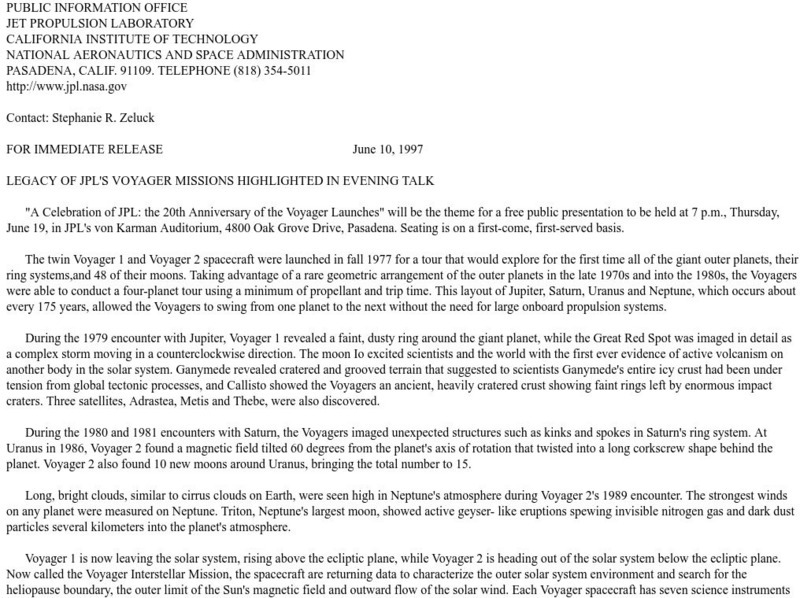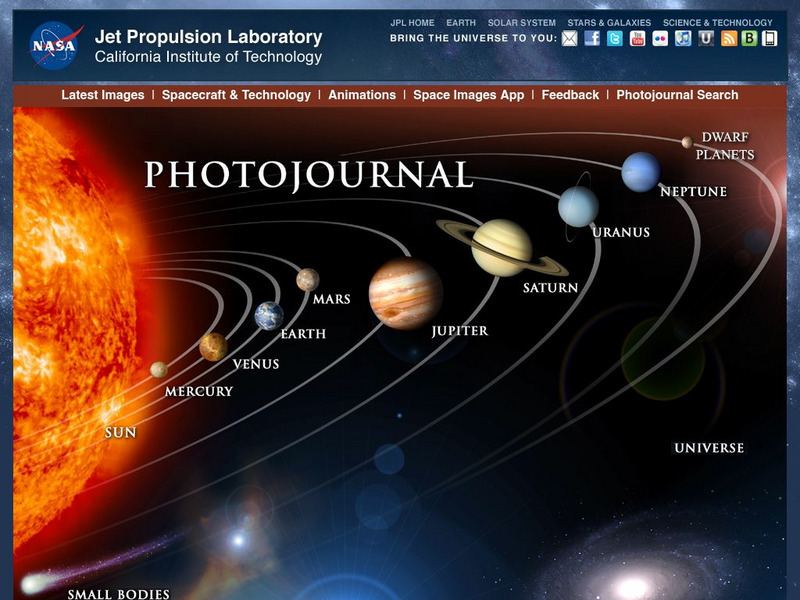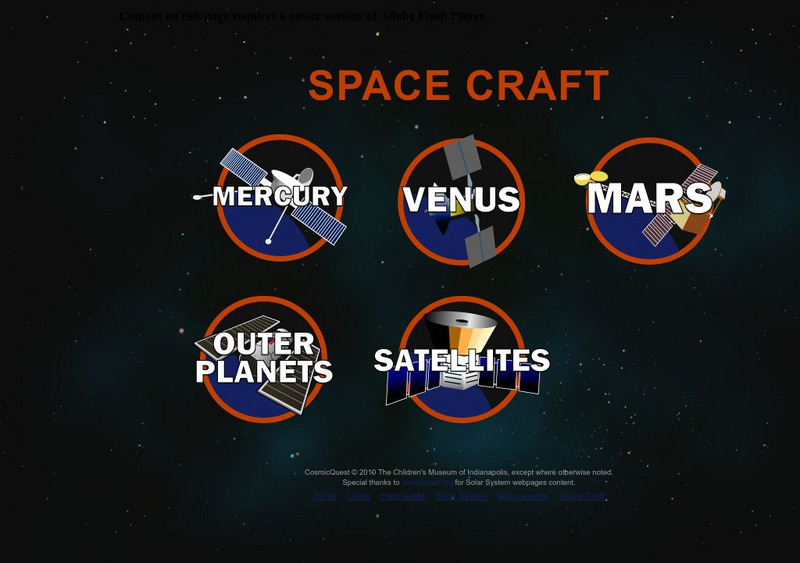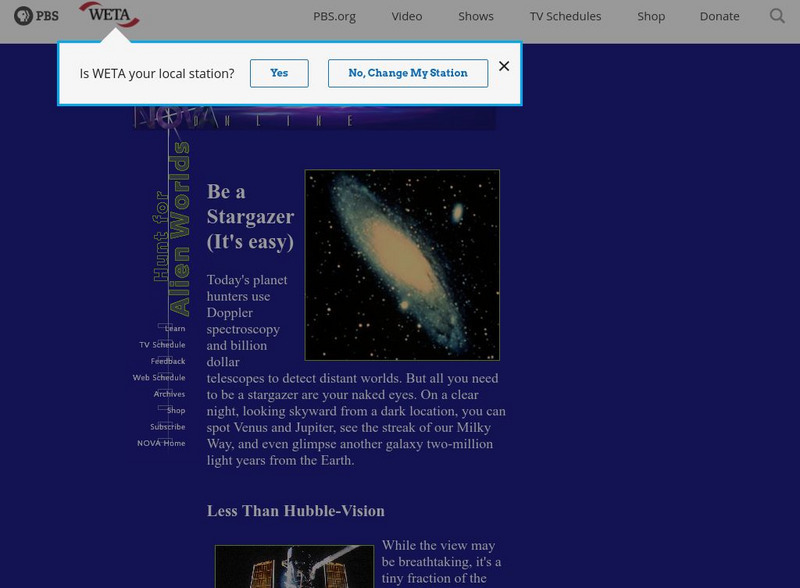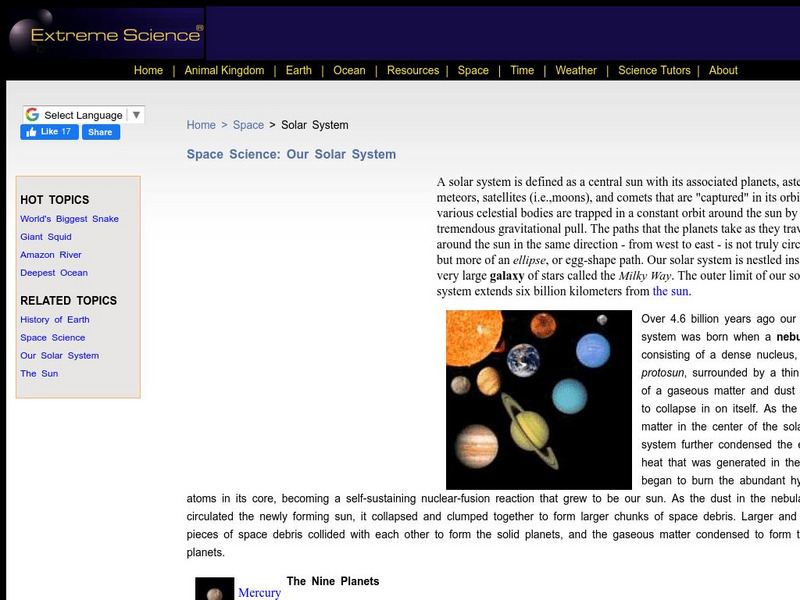A&E Television
History.com: The Space Race: Interactive Universe
A virtual journey through space offers photos and facts about Earth and its neighboring planets, comets, other celestial bodies of the Solar System, and the Milky Way and Andromeda galaxies.
NASA
Nasa Star Child: Star Child
StarChild from NASA defines and describes the Solar System in a simple and easy-to-understand manner. The website is broken down into two versions for the student, grade school and junior high.
Other
The Apollo Society: The Solar System
Contains a small set of images of solar system objects and a series of links to information about all solar system objects. Solar System Tours link to excellent image collections.
NASA
Nasa: Celebrating Voyager 1 & 2
This press release contains information about the Voyager and its history. The page gives facts about the past twenty years with the Voyager and all of its accomplishments.
NASA
Nasa: Planetary Photojournal
This NASA site provides access to publicly released images from various Solar System exploration programs.
NASA
Nasa: Planetary Data Sytem: Welcome to the Planets
Collection of images, with vocalized explanatory captions, of the planets acquired by NASA as part of its exploratory space programs.
Children's Museum
Field Guide to the Universe: Space Craft
Pictures and descriptions of the robot spacecraft that have explored the planets and outer space since the 1960s.
CK-12 Foundation
Ck 12: Earth Science: Planets in Our Solar System Study Guide
A quick overview of the eight planets in our solar system.
Science Buddies
Science Buddies: How Big Are the Planets in Our Solar System?
This activity explores the relative size of the eight planets that circle around the Sun.
PBS
Pbs: Nova Online: Be a Stargazer
This resource briefly describes how telescopes work and provides helpful tips for stargazing.
Smithsonian Institution
National Museum of American History: America on the Move [Pdf]
Discover how transportation has helped people immigrate and migrate over the years.
Curated OER
Exploratorium: Your Weight on Other Worlds
Want to lose weight in a hurry? Just step on a scale on almost any other planet! This page allows you to enter your weight on Earth and it will calculate your weight on all of the other planets, some moons and even some stars. Requires a...
Curated OER
Educational Technology Clearinghouse: Maps Etc: Plan of Pompeii, a.d. 79
A map of Pompeii showing Gate of Herculaneum (A), Gate of Vesuvius (B), Gate of Capua (C), Gate of Nola (D), Gate of Sarno (E), Gate of Nocera (F), Gate of Sabiae(G), Gate of the Seashore (H), Forum (I), Temple of Jupiter (J), Basilica...
Curated OER
Etc: Maps Etc: The Capitoline Hill and the for A, First Century a.d.
A plan of the Capitoline Hill and the Fora in Rome during the First Century AD. The plan shows the Temple of Jupiter (1), Temple of Juno (2), Aerarium (3), Temple of Saturn (4), Temple of Concord (5), Tullianum (6), Arch of Severus (7),...
Curated OER
Wikipedia: National Historic Landmarks in Alabama: Redstone Test Stand
This steel frame structure was built in 1953 and is the oldest static firing facility at the Marshall Space Flight Center. It was important in the development of the Jupiter-C and Mercury/Redstone vehicles that launched the first U.S....
Curated OER
Educational Technology Clearinghouse: Clip Art Etc: A Roman Standard Bearer
From a gravestone of the first century A.D. The standard consists of a spear crowned with a wreath, below which is a crossbar bearing pendant acorns. Then follow, in order, a metal disk. Jupiter's eagle standing on a thunderbolt, a...
Curated OER
Educational Technology Clearinghouse: Clip Art Etc: Victors at the Olympic Games
From a very remote period, the Greeks had been accustomed to engage in contests of strength and agility during their times of festivity, and also at the funerals of distinguised persons. Iphitus conceived the idea of establishing a...
Curated OER
Science Kids: Science Images: Spacetime Curvature
This computer made image shows how the idea of spacetime curvature works. The gravity that results from the presence of the Earth causes spacetime to bend. This works in the same way for other objects such as Mars, Jupiter and the Sun.
Curated OER
Science Kids: Science Images: Callisto
This is an image of Callisto, one of the moons of Jupiter. Discovered by Galileo Galilei in 1610, it is the third largest moon in the Solar System and features a heavily cratered surface. For more information, check out our solar system...
Curated OER
Educational Technology Clearinghouse: Clip Art Etc: Galileo Galilei
Galileo Galilei (15 February 1564 - 8 January 1642) was a Tuscan (Italian) physicist, mathematician, astronomer, and philosopher who played a major role in the scientific revolution. His achievements include improvements to the telescope...
Extreme Science
Extreme Science: Space Science: Our Solar System
Read about our solar system and its formation over 4.6 billion years ago. Find out about the planets, asteroids, meteors, satellites, and comets. More in-depth planet background can be accessed through links.
Text Project
Text Project: Fyi for Kids: What's Out There? [Pdf]
This is an article about Voyager I and II including when and why they came about and what information they have provided.
PBS
Nova: Signs of Life
Can you find planets that will support life? This activity will give you data for different planets and challenge you to find one that supports life.
Other popular searches
- Planet Jupiter
- Jupiter Saturn Mars Earth
- Jupiter Models
- About Jupiter
- Planets Jupiter
- Aliens on Jupiter
- View Jupiter
- Planer Jupiter
- Imagen of Jupiter
- Jupiter Io
- Aurora on Jupiter
- Jupiter Facts





